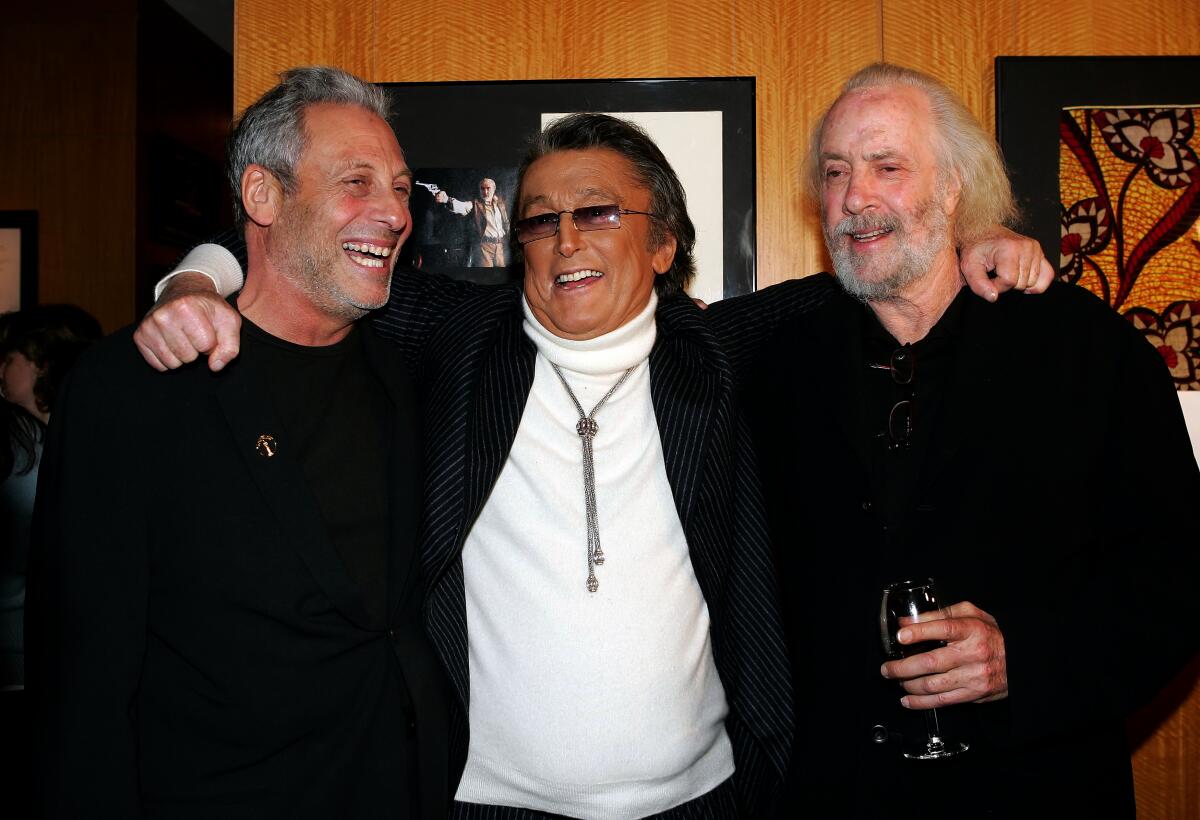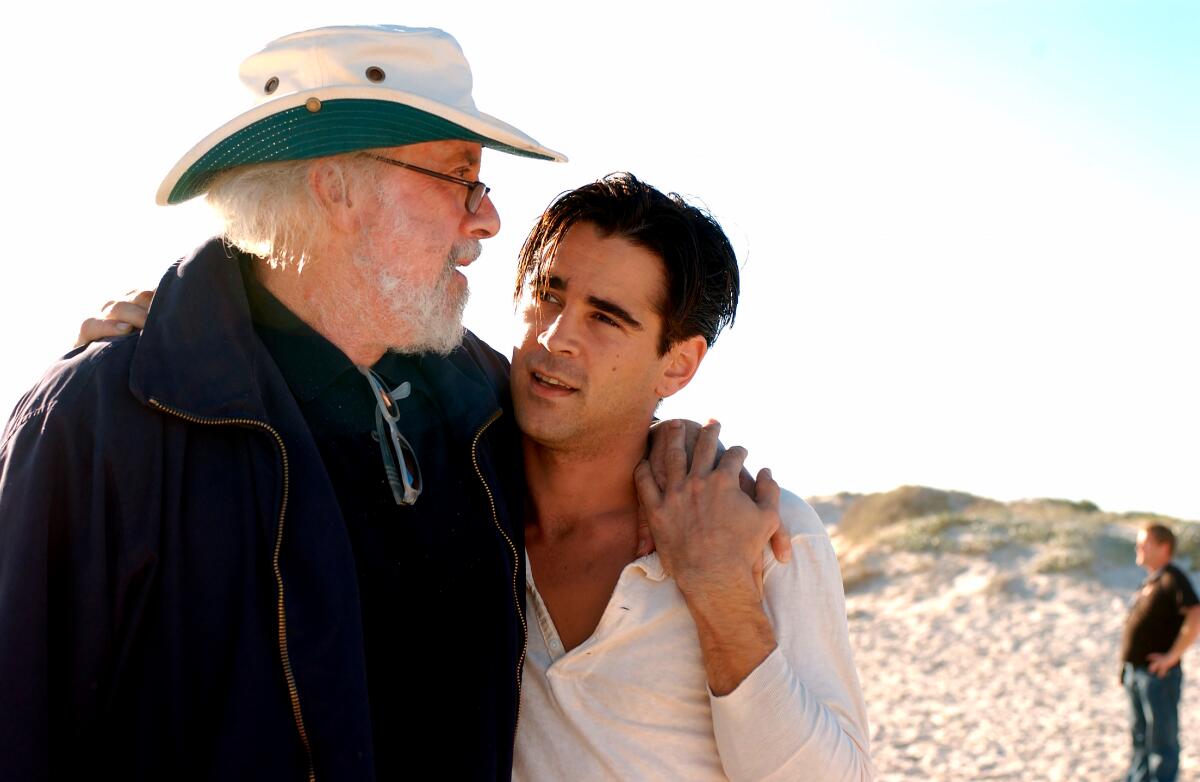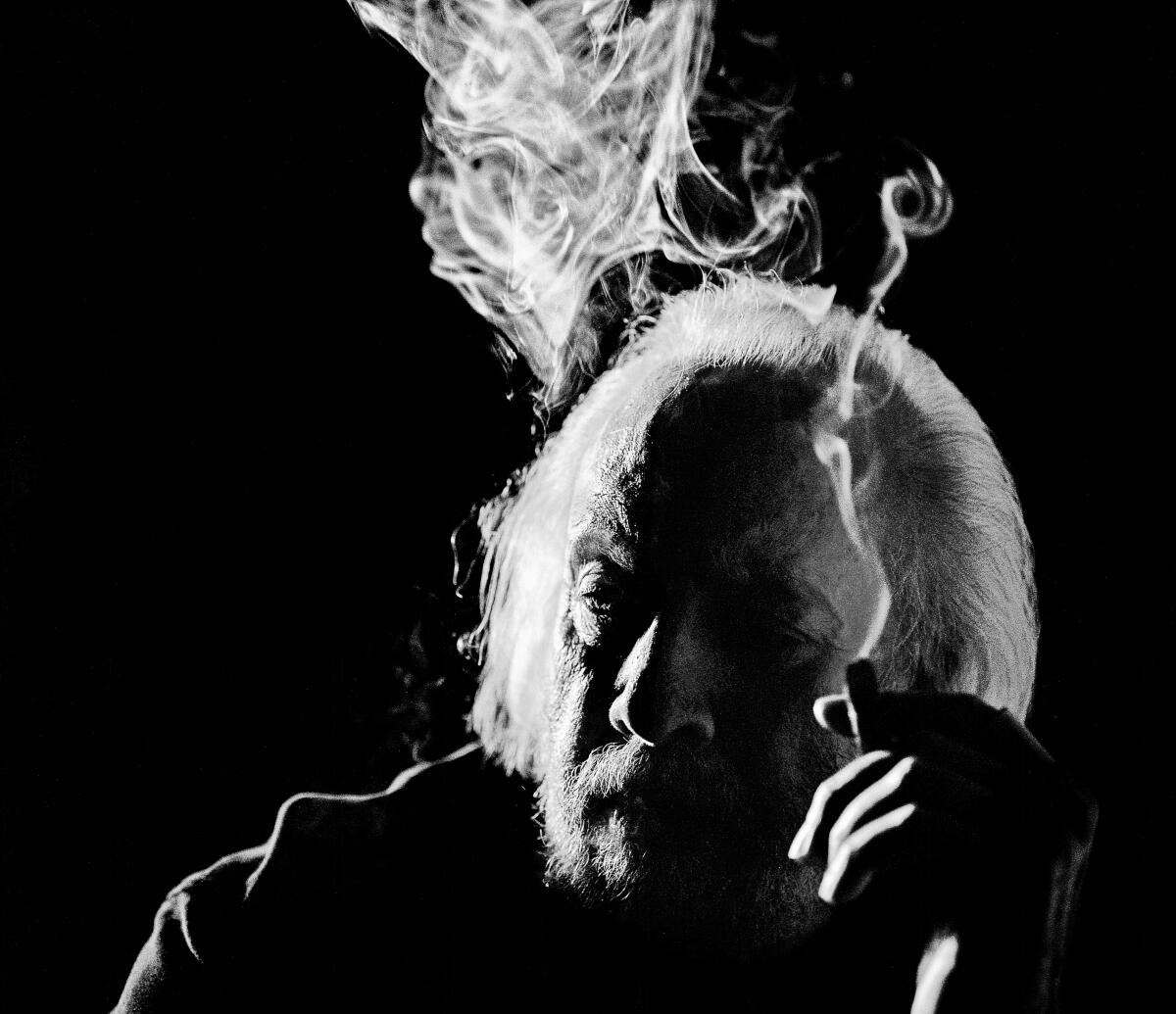Robert Towne, the screenwriting icon who gained an Academy Award for his unique script for “Chinatown,” died Monday at his residence in Los Angeles. He was 89.
His publicist Carri McClure introduced the information on Tuesday.
In a screenwriting profession launched in 1960 as a author for low-budget producer-director Roger Corman, Towne earned an early repute in Hollywood as a sought-after “script physician,” stepping in to do uncredited work on troubled screenplays for motion pictures equivalent to “Bonnie and Clyde” (1967) and “The Godfather” (1972).
Towne had but to turn into a legend of the New Hollywood period of filmmaking when he noticed a 1969 picture essay in West, the Los Angeles Instances’ outdated Sunday journal.
Titled “Raymond Chandler’s L.A.,” it featured lately shot images of Los Angeles locales taken as if it have been nonetheless the late Nineteen Thirties and ‘40s heyday of Chandler’s fictional hard-boiled personal eye Philip Marlowe, together with an evocative picture of a classic convertible parked subsequent to an outdated streetlight exterior Bullocks Wilshire, the landmark Artwork Deco luxurious division retailer on Wilshire Boulevard.
Towne, a Los Angeles native born throughout the Melancholy, mentioned in a 2008 Writers Guild Basis interview that he was amazed that “you might nonetheless recapture the L.A. that I vaguely remembered by the considered number of areas across the metropolis, a lot of which I knew.”
“That acquired me began considering.”
Certainly, Towne usually acknowledged that the picture essay was a catalyst for writing the critically acclaimed, influential screenplay for which he’s greatest identified: “Chinatown.”
Directed by Roman Polanski and starring Jack Nicholson and Faye Dunaway, the 1974 movie basic is ready in 1937 Los Angeles and options Nicholson as personal investigator J.J. “Jake” Gittes, who’s employed to analyze a supposedly dishonest husband however as an alternative finds himself enmeshed in a darkish thriller involving deception, homicide, and an unlimited water and land conspiracy within the San Fernando Valley.
Towne acquired uncommon public acknowledgment of his behind-the-scenes work in 1973 when “Godfather” director Francis Ford Coppola accepted a screenwriting Oscar for that landmark movie and, “giving credit score the place credit score is due,” thanked him for writing “the very lovely scene between Marlon [Brando] and Al Pacino within the backyard” — a scene Towne wrote the evening earlier than it was shot that illustrates the switch of energy from the aged Mafia don to his son Michael and not directly captures the love between the 2 characters.

Hawk Koch, left, Robert Evans and Robert Towne at a thirtieth anniversary screening of “Chinatown” in 2004.
(Mark J. Terrill / Related Press)
Two years later, the press was calling Towne “the most well liked author in Hollywood.”
Bookending his Academy Award-winning script for “Chinatown” have been Oscar nominations for his display adaptation of the novel “The Final Element” (1973), starring Nicholson as one in every of two Navy lifers escorting a younger prisoner to Portsmouth Naval Jail; and for “Shampoo” (1975), which he co-wrote with the movie’s producer, Warren Beatty, who starred as a womanizing Beverly Hills hairdresser.
Amongst Towne’s different screenwriting credit are “The Yakuza” (with Paul Schrader), “The Two Jakes” (a “Chinatown” sequel), “Days of Thunder,” “The Agency,” (with David Rabe and David Rayfiel), “Mission: Unimaginable” (with David Koepp) and “Mission Unimaginable: II.” As a frequent script physician, he additionally did uncredited work on movies equivalent to “Drive, He Stated,” “The Parallax View,” “Marathon Man,” “The Missouri Breaks” and “Heaven Can Wait.”
The tall, bearded and soft-spoken screenwriter who favored slim cigars turned a director with the 1982 movie “Private Greatest,” from his unique screenplay about two feminine observe stars. He later directed and wrote the screenplays for “Tequila Dawn,” “With out Limits” (written with Kenny Moore) and “Ask the Mud,” set in Melancholy-era Los Angeles.
Towne additionally co-wrote the 1984 movie “Greystoke: The Legend of Tarzan, Lord of the Apes,” which was based mostly on the Edgar Rice Burroughs novel “Tarzan of the Apes,” a mission Towne had been engaged on for a few years. However Towne, who was initially slated to direct, was so sad with the completed movie, co-written by Michael Austin and directed by Hugh Hudson, that he had his title changed within the credit with a pseudonym: P.H. Vazak, the title of his Komondor, a Hungarian livestock guard canine, who then went on to share an Oscar nomination with Austin.

Robert Towne, left, directs Colin Farrell as Arturo Bandini within the film “Ask the Mud” in 2004.
(Paramount Classics)
However none of Towne’s screenplays obtained the enduring stature of “Chinatown,” which continues to be studied by writers and film-school college students and is taken into account one of many best film scripts ever written. Primarily based on a vote of its members, the Writers Guild of America ranked “Chinatown” at No. 3 in its 2006 listing of the “101 Biggest Screenplays,” behind “Casablanca” and “The Godfather.”
In presenting Towne with an honorary doctorate of superb arts diploma on the American Movie Institute’s graduation ceremony in 2014, Coppola mentioned, “You may have in your script for ‘Chinatown’ offered the de facto blueprint for aspiring screenwriters, a platonic splendid of each construction and magnificence taught as a template all over the world.”
Within the 2020 e-book “The Huge Goodbye: Chinatown and the Final Years of Hollywood,” creator Sam Wasson revealed that one in every of Hollywood’s best-known script medical doctors acquired uncredited assist himself: For greater than 40 years, Towne paid Edward Taylor, a longtime shut good friend, to assist him together with his scripts, together with “Chinatown.”
Taylor, who was Towne’s literature- and theater-loving roommate at Pomona Faculty and later taught sociology and statistics at USC, started secretly working with Towne on his scripts within the mid-Sixties and, in keeping with the e-book, apparently had no downside with remaining nameless. Towne, Wasson wrote, continued to seek the advice of with Taylor in particular person or by cellphone till Taylor’s loss of life in 2013.
Towne, who was not interviewed for the e-book, made a veiled public acknowledgment of his secret collaborator in an introductory essay for a 1983 restricted version of the “Chinatown” screenplay: Whereas writing “the guts” of the script on Catalina Island within the fall of 1972, Towne acquired periodic visits by his good friend Taylor, whom he described as having been his Jiminy Cricket, Mycroft Holmes and Edmund Wilson since their school days.
Born Robert Burton Schwartz in Los Angeles on Nov. 23, 1934, Towne was 2 when his household moved to San Pedro, the place his father purchased a girls’s attire retailer referred to as the Towne Good Store. It wasn’t lengthy earlier than Lou Schwartz was being referred to as Mr. Towne.
“I believe he favored that,” Towne mentioned of his father, who later turned a profitable actual property developer, within the Writers Guild Basis interview. “By the point my brother [Roger] was born, he had legally modified his title.” (Roger Towne later co-wrote the screenplay for the 1984 movie “The Pure.”)
The household later moved to Rolling Hills on the Palos Verdes Peninsula after which to Brentwood.
At Pomona Faculty in Claremont within the Fifties, Towne studied philosophy. He additionally took a artistic writing class by which one in every of his brief tales, based mostly on a current stint engaged on a industrial tuna-fishing boat, “acquired all people’s consideration,” he recalled.
Whereas in school, Towne thought of changing into a journalist. However by the late Fifties, Towne, who served a stint within the Military, was in Hollywood taking an appearing class taught by blacklisted actor Jeff Corey, whose college students included James Coburn, Sally Kellerman and Richard Chamberlain. One other pupil was Nicholson, who turned Towne’s shut good friend.
“My coaching as a author actually got here from seven years of improvising in that class, and coming to have a sense for what was efficient dramatically, what was efficient by way of dialogue and simply what folks may and couldn’t say to be efficient,” Towne recalled.
His first skilled break got here when one other pupil within the class, Corman, who as a quickie movie producer and director was there to study extra in regards to the artistic technique of actors, provided him an opportunity to jot down. “It was powerful making a residing writing for Roger,” Towne mentioned, “however at the very least he gave me a begin.”
Towne’s first screenwriting credit score was for Corman’s “Final Girl on Earth,” a 1960 science-fiction movie by which Towne performed one of many three starring roles below the title Edward Wain. Beneath the identical title, he additionally was one of many stars of Corman’s “Creature from the Haunted Sea” (1961). For Corman, he additionally wrote the display adaptation of the Edgar Allan Poe brief story “The Tomb of Ligeia” (1964), starring Vincent Value.
Along with his film work, Towne wrote for tv within the Sixties, together with “The Man from U.N.C.L.E,” “The Outer Limits,” “The Lloyd Bridges Present” and “The Richard Boone Present.” A lot later in life, he was a consulting producer on the favored tv drama “Mad Males.”
Towne’s screenwriting profession started its upswing when Beatty, the star and producer of “Bonnie and Clyde,” and the movie’s director, Arthur Penn, wanted assist with a script written by David Newman and Robert Benton. For his contributions, Towne was listed within the acclaimed hit movie’s credit as “artistic guide.”
As a screenwriter, Towne is described by Peter Biskind in his bestselling e-book on the New Hollywood period, “Simple Riders, Raging Bulls,” as being “unusually literate” in “a city stuffed with dropouts, the place few learn books.”
“He had an actual really feel for the superb factors of plot, the nuances of dialogue, had the flexibility to clarify and contextualize movie within the physique of Western drama and literature,” wrote Biskind.
“He had this means, in each web page he wrote and rewrote, to depart a way of moisture on the web page, as if he simply breathed on it ultimately,” producer Gerald Ayres advised Biskind. “There was all the time one thing that jostled your sensibilities, that made the studying of the web page not only a notion of plot, however the feeling that one thing unintentional and true to the lifetime of a human being had occurred there.”

Portrait of Robert Towne in 2006.
(Damon Winter / Los Angeles Instances)
In writing “Chinatown,” with its plot revolving round a high-level water and actual property conspiracy, Towne was impressed by parts of the controversial historical past of the Los Angeles Aqueduct that introduced water from the Owens Valley within the jap Sierra Nevada right down to L.A. earlier within the century.
“All the pieces about it [‘Chinatown’] was an try to take an present style and imbue it with issues from life,” Towne advised The Instances in 2004. “To not do an unique film about Maltese falcons and jewel-encrusted birds, however to take a criminal offense that was proper in entrance of your face, that was as primary as water and energy. And a detective who was not a tarnished knight like Philip Marlowe, however form of a sleazy, charming, dapper man who would solely take [divorce] circumstances as a result of they made him probably the most cash.”
Earlier than the filming of “Chinatown” started in 1973, Towne and Polanski argued always throughout the many weeks they spent condensing and revising Towne’s prolonged screenplay.
Their largest battle was over the ending.
Towne needed Evelyn Mulwray (Dunaway), the widow of the murdered chief engineer of the Division of Water and Energy, to kill her father, the wealthy and ruthlessly highly effective Noah Cross (John Huston), who had raped her as a young person and was the daddy of her younger daughter, whom she was decided to steer clear of him.
However Polanski, whose pregnant actress-wife Sharon Tate had been murdered by members of the Manson household in 1969, had one thing much more chilling in thoughts: He needed Evelyn to die on the finish and her daughter fall into the palms of her father — evil triumphant.
The director had his manner, and the movie involves its memorably stunning conclusion as Evelyn makes an attempt to flee together with her daughter in a automobile on a avenue in Chinatown.
A critically acclaimed box-office hit, “Chinatown” acquired 11 Academy Award nominations, together with greatest image, director, actor and actress.
And as Towne, the movie’s solely Oscar winner, advised The Instances in 1999, he had since come to agree that Polanski “was proper in regards to the finish.”
In 1997, Towne acquired the Display Laurel Award, the Writers Guild of America’s highest award for screenwriting, which is given in recognition of a author’s physique of labor.
Towne had a daughter, Katharine, together with his first spouse, Julie Payne (the daughter of actors John Payne and Anne Shirley); the wedding led to divorce. He additionally had a daughter, Chiara, together with his second spouse, Luisa Gaule.
McLellan is a former Instances workers author.













